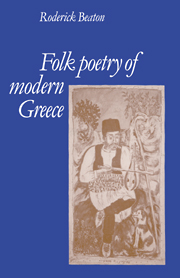Book contents
- Frontmatter
- Contents
- Preface
- Maps
- 1 INTRODUCTION
- 2 THE DEMOTIC TRADITION: THE SONGS
- 3 STRUCTURE OF THE DEMOTIC TRADITION: THE FORMULA
- 4 STRUCTURE OF THE DEMOTIC TRADITION: IMAGERY AND THEMES
- 5 THE EMERGENCE OF THE DEMOTIC TRADITION
- 6 FUNCTION OF THE DEMOTIC TRADITION: THE SONGS AND HISTORY
- 7 THE SONGS AS MYTH
- 8 ONE TRADITION OR SEVERAL?
- 9 THE HISTORICAL TRADITION
- 10 GREEK FOLK POETRY AND WRITING
- Notes
- Glossary of Greek words transliterated in the text
- Bibliography
- Index
3 - STRUCTURE OF THE DEMOTIC TRADITION: THE FORMULA
Published online by Cambridge University Press: 13 September 2009
- Frontmatter
- Contents
- Preface
- Maps
- 1 INTRODUCTION
- 2 THE DEMOTIC TRADITION: THE SONGS
- 3 STRUCTURE OF THE DEMOTIC TRADITION: THE FORMULA
- 4 STRUCTURE OF THE DEMOTIC TRADITION: IMAGERY AND THEMES
- 5 THE EMERGENCE OF THE DEMOTIC TRADITION
- 6 FUNCTION OF THE DEMOTIC TRADITION: THE SONGS AND HISTORY
- 7 THE SONGS AS MYTH
- 8 ONE TRADITION OR SEVERAL?
- 9 THE HISTORICAL TRADITION
- 10 GREEK FOLK POETRY AND WRITING
- Notes
- Glossary of Greek words transliterated in the text
- Bibliography
- Index
Summary
COMPOSITION AND TRANSMISSION
We cannot know for certain how Greek folk poetry was composed. It is clear, however, that by the mid-nineteenth century, when songs began to be written down and published in large numbers, a corpus of songs already existed which must have been composed without the aid of writing and in which variations occurred which could not be explained by any process of transmission applicable to a written text. The question of the origin of the song tradition, which it may as well be admitted at once is probably insoluble, will be discussed more fully in Chapter 5; here it is enough to mention that songs roughly of the type recorded during the past century and a half appear to have been sung in Greek-speaking lands for at least four hundred years before they began to be collected and edited. The evidence of the variants discussed in the last chapter suggests that, although the singers may have been conservative in introducing radical innovations into songs, there was never any particular insistence on the exact repetition of an established text.
This is a point worth making, since oral transmission, in the sense of handing down ‘texts’ without the use of writing, can take different forms. In Yugoslav tradition, for example, it has been shown that singers substantially alter songs which they have heard. But they are not conscious of doing so, since the story remains the same.
- Type
- Chapter
- Information
- Folk Poetry of Modern Greece , pp. 35 - 57Publisher: Cambridge University PressPrint publication year: 1980

